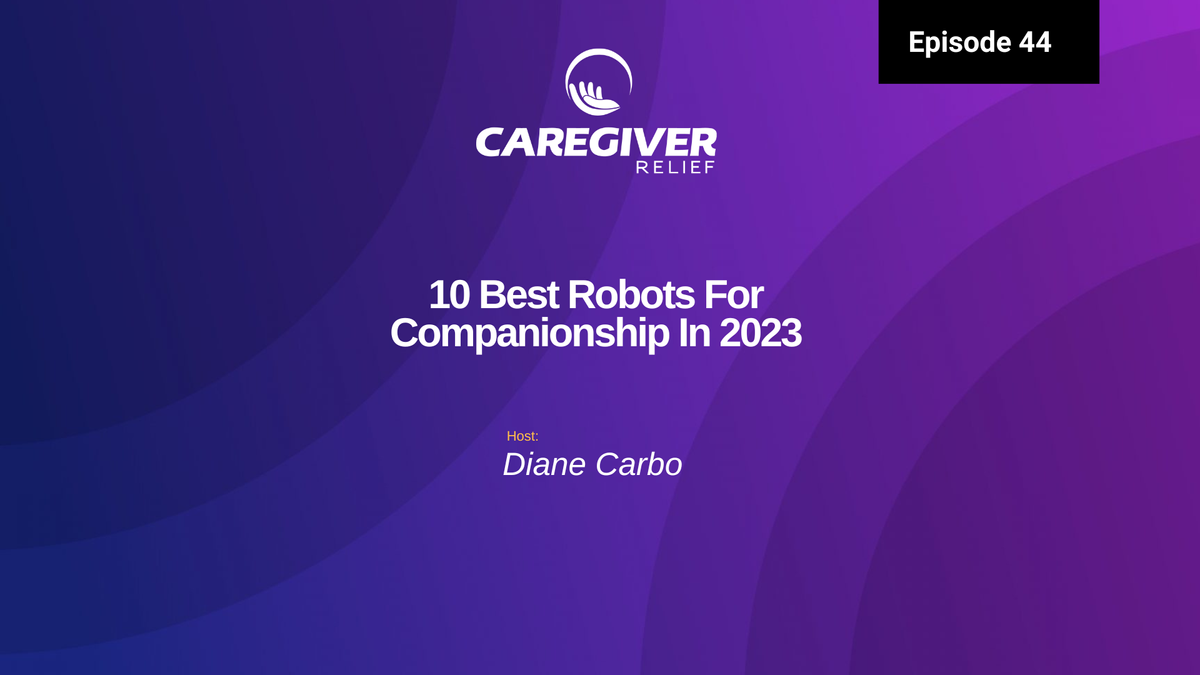Episode 44 - 10 Best Robots For Companionship In 2023

Welcome. Today's topic is The 10 Best Robots for Companionship in 2023. I'm really excited about this topic. Imagine a world where loneliness and social isolation could be addressed with the help of a personal robotic companion.
This may seem like science fiction, but it's becoming a reality, especially for a 93 year old woman who found a friend in her robot companion. And this audiocast will explore the fascinating world of robots for companionship and their potential to improve our lives. In summary, we're going to talk about robots are becoming increasingly popular companions enabled by artificial intelligence and robotics advancements.
We're going to discuss the ethical considerations that must be taken into account to assure the rights of those they serve. And companion robots can facilitate social connections and offer emotional support in many areas of life. So let's talk about the rise of companion robots. Advancements in artificial intelligence and robotics have paved the way for the development of personal robots designed to interact with us and perform various tasks in our environment.
These social companion robots aim to address loneliness and social isolation by offering a robotic companion that can assist with household chores, provide emotional support and even help care for elderly family members. As technology continues to evolve, so does the potential for these companion robots to become more human-like capable of providing a level of human care that was once thought to be exclusive to humans. With reduced human interaction, research has shown that interacting with a companion robot can lead to decreased loneliness and even lower blood pressure. But how did we get here and what does the future hold for companion robots? Artificial intelligence and robotics have been instrumental in developing family robots that can interact with us, recognize our emotions, and provide personalized experiences.
Take the vector robot, for example. This AI robot can interact with family members, provide assistance, play music, navigate its environment with ease. With advanced sensors capable of detecting the direction of sound, vector robots showcases the potential of social robots that can interact with human beings in a way that was once thought impossible.
As the technology behind artificial intelligence and robotics continues to advance, we can expect the integration of family robot technology to become even more capable of providing a better human-like experience. Some potential advancements in the future of personal robots include understanding our emotions, adapting to our preferences, assisting with household tasks, providing companionship and entertainment.
The future of personal robots is truly exciting, so let's address loneliness and social isolation. Loneliness and social isolation are becoming increasingly prevalent issues globally with around 10% of people in the UK feeling isolated regularly, and the New York Times even call it an epidemic in the US.
Companion robots offer a potential solution providing emotional support, helping with household chores, and even offering companionship to older adults and those living alone. However, implementing interventions involving companion robots for older adults requires a user-centered design approach involving the target users in the design process and ensuring that policies are in place to protect their rights and interest.
Although there are concerns about the effectiveness of companion robots in addressing loneliness, particularly among older participants, their potential benefits in reducing loneliness and social isolation cannot be ignored. Let's talk about the top companion robots for companionship. So let's take a closer look at some of the top companion robots available in the market today, each with their unique features and benefits.
Meet buddy. I'm going to introduce you to Buddy, your new emotional companion robot that's here to protect, assist, and connect with you. With his wide eye and friendly demeanor, buddy can offer reminders, create social connections and even play music to brighten up your day. It's the perfect companion for seniors who may need some extra support, providing security, social interaction, and cognitive stimulation.
Plus, buddy can help you keep updated with the news and important phone calls. Experience the joy of having Buddy by your side. Now let's meet Jibo. Jibo is the sleek and shiny robot that fits perfectly in your home. This visually appealing companion is equipped with sensors that allows it to interact and assist your elderly loved ones with daily tasks they may struggle with. It's advanced motor system allows Jibo to express human-like emotions through body movements and its cameras can monitor the environment and capture special moments.
With Jibo's touchscreen, you can video call your loved ones from anywhere, set reminders and enjoy interactive brain games. Never feel alone or life isolated again with Jibo as your companion. Now I want you to meet iPAL, the humanoid social robot. Introducing iPAL, the humanoid social robot designed to serve the elderly as a companion educator, and safety monitor. With his ability to move around your home and community,
iPAL offers singing, dancing, assistance with daily activities and obstacle avoidance. Connect with your loved ones remotely and let iPAL provide drug reminders, emergency alerts, conversations, entertainment, and more. With its advanced capabilities, iPAL ensures that your elder loved ones are never alone and always supported.
Meet Ado. Ado is here to improve the quality of life for humans of all ages with its affordable and user-friendly robotics. This next generation service robot is designed for households, hospitality, and healthcare, making it the perfect solution for your loved ones. From handling household chores to keeping your home connected and safe.
Ado, does it all. Enjoy games, movies, and interactive learning with a Ado's projector and speakers. Stay organized with voice control features and stay active with Ado's proactive lifestyle monitoring. Let a Ado be your helpful companion. Now meet Alpha Mini. Alpha Mini is a highly portable and intelligent companion robot that brings interaction, expressions and functionality wherever it goes.
This little companion bot can dance, do kung fu, and even recognize faces and objects. With voice interaction and 4G L T E connectivity, alpha Mini offers a wide range of features to enhance your experience. Its expressive LCD eyes makes it feel like a true friend who can bring joy and excitement to your life.
So say hello to the perfect little companion. Meet Emo an artificial desk pet. Looking for fun and engaging companion to keep your company at your desk. Meet Emo AI desktop pet. This little robot is designed to bring joy and entertainment to those sitting around at their desk.
With Emo, you can enjoy face recognition, a unique character, engaging games, and voice assistance all in one adorable package. But what sets Emo apart is its ability to autonomously explore its surroundings, track sounds, recognize faces, and even dance to music.
Thanks to the power of artificial intelligence. But Emo is more than just a robot. Its personality is shaped by its environment and your interactions making it a truly personalized companion. Developed by living AI, Emo ai desk pet showcases the incredible potential of AI and creative interacted and engaging personal robots.
Meet Ollie, a robot with feelings. Meet Ollie with feelings, your evolving home companion. Imagine having a home robot that adapts to your individual needs and preferences. Introducing Ollie, a robot with feelings, the first ever home robot with an evolving personality. Ollie's advanced machine learning technology allows him to do more than just respond to commands.
He proactively assist you with your day-to-day activities and routine, remembering your habits and setting reminders. Created by EMO tech's AI researchers, and neuroscientists, Ollie's AI system provides a personalized experience through emotional understanding and real world adapting. Ollie can understand your patterns, schedules, and even the weather forecast.
Ollie is not only one of the most advanced companion robots out there, but he is also one of the most affordable and convenient. And I see I could have a lot of fun with Ollie. Oh, the trouble we could get into together. Meet Perro, the interactive robot, bringing animal therapy to hospitals and nursing homes.
Imagine receiving the benefits of animal therapy without the need for live animals. That's where Perro comes in. Perro is an advanced and interactive robot designed to reduce stress and stimulate social interaction in hospitals and care facilities.
Equipped with five kinds of advanced sensors, Perro can perceive people and its environment. It can recognize light, darkness, petting voice, direction, and even certain words. Perro also has learning capabilities behaving in a way that users prefer. It can remember people by their voices and adjust its behavior accordingly.
You can now provide your loved one with a comfort and companionship they need thanks to Perro. Meet ElliQ, your friendly and intelligent companion for older adults. Looking for a caring companion for your older loved ones. Meet ElliQ, the friendly and intelligent companion robot, specifically designed for seniors, always there to offer tips, advice, and companionship. ElliQ is dedicated to creating a magical relationship with everyone she interacts with. With intelligent conversation, health reminders, music streaming, curated videos, and more,
ElliQ brings joy and engagement to seniors. She proactively learns about each user tailoring her activities and conversations to their individual needs and preferences. By analyzing voice, gaze and touch, ElliQ forms a natural and personalized connection with users helping ward off dementia, depression, and social isolation. Rest assured, ElliQ prioritizes your privacy and security. The team behind ElliQ has implemented top-notch security architecture to protect your data.
Your information remains safe and private as Eli Q is the only one with access to the collected information, your loved ones can enjoy the companionship of ElliQ without any concerns about their privacy. So now let's meet ABO the robotic therapy pet. ABO the robotic therapy PET has lifelike companionship for seniors.
Numerous studies have shown the positive effects of therapeutic pets for seniors. With ABO Robotic Therapy PET created by Sony, your loved ones can experience lifelike companionship like never before. ABO is packed with advanced technology from physically showing body temperature changes to sparkling eyes that speak volumes bursting with life and energy.
ABO is guaranteed to put a smile on your loved one's face. Curiosity drives ABO to offer new, fun and engaging experiences over time. Give your loved ones the joy and companionship they deserve with ABO Robotic therapy pet. So let's talk about the ethical considerations and privacy concerns. As we delve deeper into the realm of companion robots.
It is crucial to address ethical considerations and privacy concerns surrounding their use. These include deception, moral dilemmas, data collection, security deception is a major concern when it comes to companion robots and they are designed to interact. So let's talk more about deception and moral dilemmas.
Deception and moral dilemmas arise when users are led to believe that companion robots are real or human. This is particularly concerning in the case of dementia patients, when the use of companion robots could mislead and disorient them about the source of the voice, taking away meaningful conversations and a lack of personal connection.
I really have a hard time with that. I don't agree with that, and here's why . People with dementia are living in the moment. They have no way to see their future and their past is leaving them a little at a time, so their short term memory is gone. So when they are talking to somebody, we hear about the long goodbye.
And dementia is that where you have fleeting moments, where you can see the light come on in your loved one's eyes, and you have hope that they're there and they're connecting with you. And they will for even just a nanosecond, you feel that connection and then just the very next second, that light goes off and that dull stare looking back at you. So when they're concerned about dementia patients, I prefer to think of dementia patients as living in the moment. They truly are living mindfully. And if they find comfort and they find solace and they find trust and security in interacting with a robotic pet. Then I say that we should allow them to have them.
And I'm going to say there is no replacement for human touch and human interaction, but we have a public health crisis here globally, not just in the US where we have more seniors than youth, so we have limited people to take care of us. I know in assisted living in nursing homes, the number of staff to patient ratio is high. Nursing homes, the aides are taking care of six if they're lucky
to 12 patients on a shift, which is not humanly possible for anyone to provide care when they're supposed to feed them, dress them, or undress them. Bathe them, or put them to bed. There's so many things and if they're in bed, they're supposed to be turned every two hours, they're supposed to receive oral care, they're supposed to have their backs rubbed and skincare given, and it's just not being done because it's not humanly possible to provide standard quality care anymore. And it's been that way for a long time. I want to say that when most participants in a study were not in favor of their primary support person, letting them believe a companion robot is a human if they have dementia, I will tell you, I think that the participants don't understand dementia because, as I said, if they're at a point where their short-term memory doesn't exist anymore, then I don't think there's any harm in letting a person enjoy the interaction with that creature. I just don't. Navigating the ethical challenges of deception and moral dilemmas in human robotic interaction is an important aspect to consider when designing and using companion robots.
I agree we have to worry about deception and moral dilemmas. I have a hard time with artificial intelligence. You have to worry about who is creating them, what the agenda is for these people when they are creating these. So it is a problem. But as far as a dementia patient having the comfort of an animal, if they were an animal lover and it can't be a real animal, I think it's fine.
And I think family members and staff and nurses may agree with me. Data collection and security. Data collection and security concerns involve the potential misuse of personal information gathered by companion robots, as well as the risk of hacking an unauthorized access.
I agree those are concerns. If a personal information gathered by companion robots is misused, it could lead to a loss of privacy and security for users. That I agree with totally. People will say things that especially with dementia, that can cause for alarm and if it's used against them in any way or a family member in any way, that can be a challenge.
There is also a risk that malicious actors could gain access to sensitive information or control the robot remotely posing significant security threats, and that is my biggest concern. It is essential to use encryption, secure data storage, and user authentication
to ensure data security and privacy when using companion robots, and I do agree with that. We have to be careful and there has to be double, triple security measures taken in place because it's going to be done in the home. So enhancing human interaction with companion robots. To harness the full potential of companion robots, it's important to focus on enhancing human interaction with these robots while promoting human contact. This involves balancing robotic and human interaction as well as encouraging social interaction through robotics. Yes. We have to find that balance between human interaction and robotics. And I think that some of these therapeutic robotic pets are really going to help.
Robots should be designed to interact with humans in a natural and intuitive way, and I see that happening. This is definitely going to happen. So balancing robotic and human interaction ensures that companion robots do not replace human connections, but rather supplement and enhance them. Absolutely. By setting limits on the amount of time spent with robots and actively promoting meaningful conversations and activities with robots, they can be used to supplement human interaction instead of replacing it. While making decisions about how much robotic and human interaction is suitable, it's considered to the ethical issues like deception, moral quandaries, data gathering, safety.
By striking the right balance, we can maximize the benefits of companion robots while minimizing potential risks and concern. Encouraging socialization through robotics. Encouraging socialization through robotics involves designing companion robots that promote interaction with other humans, creating a sense of community and connection.
Promoting socialization through robotics can offer emotional support, enhance cognitive and social skills, reduce loneliness, and improve mental health and wellbeing. However, there are challenges to consider when promoting socialization through robotics, such as ethical considerations, privacy concerns, and finding the right balance between robotic and human interaction.
By addressing these challenges, we can create a future where companion robots help foster social connections and improve our quality of life. So let's talk about the future developments in companion robots. As we look towards the future, we can expect exciting developments in the world of companion robots.
This includes advancements in artificial intelligence and expanding applications in various fields. These developments will open up new possibilities for how we interact with robots and how they can help us. There's advances in artificial intelligence. Advances in artificial intelligence or AI will enable companion robots to become more sophisticated, adaptive, and capable of providing personalized experiences and support.
Cutting edge AI systems like GPT-3 and AlphaGo showcase the potential for AI to revolutionize the way we interact with robots and the world around us. As AI continues to evolve, we can expect even more advanced and adaptive companion robots that offer tailored experiences and existence making our lives easier and more enjoyable.
Also, they're going to be expanding applications. The expanding applications of companion robots will see them being used in diverse areas such as healthcare companion robots that can monitor vital signs, give reminders for taking medication and offer companionship to patients. Education, they can help students learn and understand complex concepts, provide personalized instruction and even help with language learning.
Future developments and companion robots is personalized assistance. Offering companionship and support to a wider range of users. As companion robots continue to develop and expand their applications, we can look forward to a future where they play even more significant role in our lives, offering companionship support and assistance in various aspects of life, including the ability to play games.
In conclusion, companion robots hold great promise in addressing loneliness and social isolation, enhancing human interaction and offering support in various aspects of our lives. As technology continues to advance, we can look forward to even more sophisticated, adaptive, and personalized companion robots that make our lives easier and more enjoyable.
The future of companion robots is truly exciting and we can't wait to see what's in store for our robotic friends. Now I'm going to address some frequently asked questions I get about robots. Can a robot really be a companion? Yes, robots can be companions. Perro is a great example of a pet type robot system developed to provide companionship and support to the elderly living alone. People may also value a robot primarily for its companionship and other contexts. I have to tell you, I came across Perro 11 years ago. And Perro was just making his debut. The Japanese have been doing research for the last 20 or 30 years on how to handle the growing aging population.
They saw that there was a low birth rates were impacting the ability to provide care for our seniors in the future, and they were addressing many different issues and Perro is very expensive. I think they charged $6,000 and I can see why hospitals and nursing homes would want it.
There are so many more interactive pet type robots for companionship, developed now for every budget. But Perro was just incredible and it's going to be used for patients with dementia all over the world. What robots help with loneliness? You know what, there's quite a few, Perro the baby robot seal helps with loneliness, providing comfort in reducing stress hormones.
The F D A has even approved it as an insured cost for patients with depression and anxiety. Whoa, that's pretty incredible. Now if you can get your insurance to pay for that robot, I say go for it, because Perro is incredible, but if your insurance won't pay for it, there are so many different types of therapeutic pets right now that are robotic.
Definitely get one for your family member, but I'd be inclined to definitely try to get the insurance to pay for it. What are some of the top companion robots available in the market today? Four of the top companion robots available today are Miko, Three, EMO AI desktop pet, Lova, and Willow. And I have covered all of these robots in various audio casts in my caregiver relief section.
So please check it out. How can companion robots help address loneliness and social isolation? Companion robots offer much needed companionship to those living alone, providing emotional support in helping with daily tasks. They can be especially beneficial to older adults that live alone. This lesson has been brought to you by caregiver relief. I'm Diane Carbo, rn.




